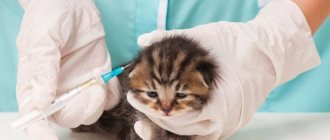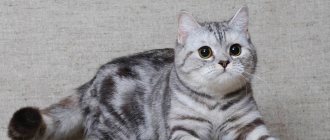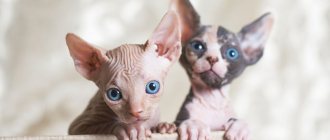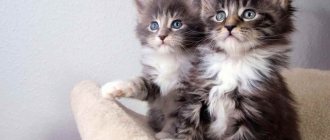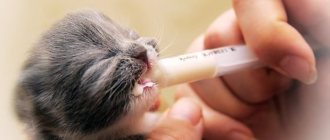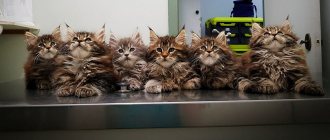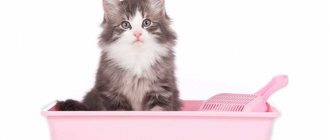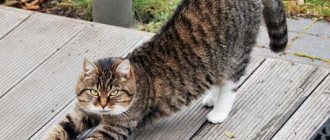As a rule, Scottish Fold kittens do not leave the house most of the time, or even their entire lives. However, even such domestic cats need vaccinations due to their rather weak immune system. " When to vaccinate Scottish Fold kittens? What vaccinations should kittens have? - interests many future and current owners. At what age should a Scottish Fold kitten get its first vaccination? In what order should they be done? Which there should be a break between injections? We will try to answer these and other questions in this article. Vaccinations for Scottish kittens should be done and prescribed exclusively by a veterinarian.
Do Scottish Fold kittens who are always at home need vaccinations?
First, let’s answer the question: “How does a Scottish kitten become infected if it is at home?” Various options are possible. Therefore, the question of whether a Scot should be vaccinated is definitely important to decide as soon as possible. For example, the infection can be brought by owners from outdoor shoes. Or, for example, if a kitten sleeps on the doormat , where a person’s foot first steps when he comes home. So even such little things are enough for a young Scottish cat to get sick. That’s how fragile the immune system is in these cute creatures with touchingly floppy ears.
A baby can also get sick while in a veterinary center, because there are a lot of sick animals here. Remember that vaccinations for Scottish Fold kittens are not able to protect your pet 100% from diseases, however, they will create decent basic protection, which will subsequently create a strong and healthy immune system.
Which cat class to choose
All kittens sold today by breeders and nurseries, regardless of breed characteristics, can be represented by several classes:
- PET animals or “pet class” - includes purebred kittens that have some deviations from the standards established by felinological organizations. As a rule, deficiencies or defects are not too pronounced and do not affect the quality or length of life. Animals of this class cannot be used for breeding or exhibition, so they are most often purchased simply as pets;
- BREED or “breed-class” pets are purebred animals that fully comply with all established standards. Such Scottish Fold cats are used for breeding and also actively participate in exhibitions. In some cases, kittens of this class are transferred with age to the category of SHOW pets, capable of producing offspring with high breed characteristics;
- SHOW-class kittens are purebred pets that maximally comply with absolutely all breed standards established in well-known felinological organizations. These are very expensive animals, the birth of which is determined by the competent approach of the breeder or nursery owner to breeding programs. A significant number of “Show-class” kittens in a litter is evidence of the high professionalism of the breeder.
This is interesting! With the right choice of a “breeding class” cat, a purebred cat most often gives birth to beautiful kittens that even belong to the “show class”.
In some cases, breeders select Scottish Fold kittens, which belong to the VIP class and are distinguished by the highest possible breed characteristics.
Return to content
Vaccination schedule for Scottish kittens
For the convenience of the owners, we have compiled a vaccination schedule for the Scottish Fold kitten . Then your adorable kittens will receive all the necessary injections on time. And the graph looks something like this:
- Panleukopenia - the very first vaccine - 8 weeks, 2nd vaccine - 12 weeks, should be repeated annually. Vaccination is mandatory.
- Calcivirosis - first vaccine - 8 weeks, 2nd vaccine - 12 weeks, should be repeated annually.
- Feline rhinotracheitis - first vaccine - 8 weeks, 2nd vaccine - 12 weeks, should be repeated annually. Vaccination is mandatory.
- Chlamydia - first vaccination 12 weeks, 2nd vaccination 16 weeks, must be repeated annually, this vaccination is recommended.
- Leukemia - first vaccine - 8 weeks, 2nd vaccine - 12 weeks, should be repeated annually. Vaccination is recommended.
- Rabies - 3 months, re-vaccination is not necessary, it must be repeated annually, it must be done.
Of course, even if you do all these injections, no one guarantees 100% protection against diseases. But this is an important part of developing the animal’s immunity, because it is so important to provide protection at such a tender age.
When to start vaccinations for Scottish Fold kittens?
This issue is being debated among different breeders, veterinarians and owners. However, veterinary experts recommend administering the vaccine no earlier than 3 months. So, until this age, the animal should be protected from close contact with relatives, and also avoid places with large concentrations of animals, for example, markets or exhibitions .
How to prepare a Scottish Fold kitten for vaccination
Ten days before the date of the intended vaccination, the cat should be dewormed, since the animal must be completely healthy for vaccination.
Products for this procedure can be easily purchased at any pet store. Dewormers should be used 2 hours before the animal eats. This must be done, because in this case there is a greater likelihood that artificial immunity will work properly. It is also necessary to remember that before the injection the animal must be completely healthy and not suffer from any diseases, and also not cough. It is necessary to care for the kitten after the vaccine especially carefully, since the animal has suffered real stress, because no one likes it when a needle is inserted into you, and even in an unfamiliar place. Care consists primarily of minimizing contact with other animals. Nutrition are also very . It should be easily digestible and low in calories. Now you know what vaccinations your kitten needs.
Possible consequences after vaccination
After immunization, some unpleasant consequences are possible:
- lethargy;
- lack of appetite;
- elevated temperature;
- pain at the injection site;
- encephalitis;
- polyneuritis;
- arthritis;
- convulsive conditions;
- changes in behavior;
- loss or change in hair color in the area where the medication was administered.
Increased sensitivity to the vaccine and immune reaction may manifest itself as:
- inability to develop immunity after injection;
- tumors at the injection site;
- reactions caused by incorrect or untimely vaccination.
How can a veterinarian help your kitten?
Veterinary doctors specialize in providing medical care in a comfortable home environment that only the owner can create. This is why administering injections at home is so important. After the injection, the cat can immediately fall into the hands of a caring owner, who will console him and, of course, give him a treat. Having a doctor visit your home is very convenient, just check out our advantages:
- You don't waste time visiting the veterinary center.
- You can get modern doctor's help.
- Avoid nervous sitting in line.
- You can communicate more productively with a specialist.
All these advantages prevail over the advantages of staying in a regular veterinary clinic. very convenient that you can donate blood, if necessary, at your home. Of course, preparation for analysis will also be required, but that’s a completely different story. Caring for straight-eared and lop-eared kittens is slightly different , since lop-eared kittens have a more weakened immune system. A veterinarian from our Ya-Vet center will also give recommendations on caring for the kitten in the period after the vaccine.
What documents should there be?
When purchasing a kitten, special attention should be paid to completing the full package of documents:
- the purchase and sale agreement must stipulate all the terms of the transaction, and also indicate the breed and color of the kitten, its date of birth and gender, nickname, and full cost. Among other things, the document must indicate the contact information of both parties and the club in which the mother cat was registered;
- the pet's birth certificate, drawn up during the certification process by a representative of the club, at approximately one and a half months of age of the kitten. In the future, based on this metric, the pedigree of the purchased kitten will be written out, which is analogous to a standard human passport;
- pedigree (instead of birth statistics), which indicates the gender and name, as well as the date of birth of the kitten, its breed and color. The document contains the names, titles, main breed characteristics of the ancestors, as well as their registration numbers and pedigrees. It is mandatory to have information about the breeder, the club seal and the signature of the registering specialist.
This is interesting! Nurseries with a good reputation prefer to supplement the package of mandatory documents with a leaflet containing information regarding the care and feeding of a Scottish Fold kitten.
The kitten’s veterinary passport, issued by specialists from a veterinary clinic during the very first vaccination, will require special attention.
Return to content
What is the care of a Scottish Fold kitten during the post-vaccination period?
Of course, after such an unpleasant procedure, the veterinarian is simply obliged to give recommendations on the specifics of caring for a Scottish Fold kitten in the post-vaccination period. So that the kitten does not get sick during the development of the immune system. After the vaccine is administered, the cat experiences extreme stress , and therefore we have the courage to give the following recommendations, thanks to which the process will go much easier and faster:
- Shake off outdoor shoes thoroughly, or better yet, put them out of reach of your pet.
- Wash the rugs thoroughly, do this as often as possible, as traces of street dirt and parasites may remain on them.
- If there are other animals in the house, for example, dogs, then it is strongly recommended to isolate them from each other, since a dog can walk outside and bring a whole bunch of infections from there. Also wash your dog’s paws more thoroughly, preferably using shampoo.
- Wash the floors in your home as often as possible, because even a minor microbe can develop into a fairly serious complication.
- Keep food and water bowls clean. This measure will help avoid infection if several cats and other animals live in the apartment.
- Review your diet and offer your baby fruit.
- Ask your doctor about medications that will help build immunity, such as immunomodulators.
The animal will also need to be monitored in the first few days after the vaccine is administered. You should be alert to the following signs:
- Confused consciousness of the pet, impaired coordination of movement.
- Profuse salivation.
- Inappropriately bulging pupils.
- Excessive thirst.
- Suppressed or, on the contrary, increased appetite.
All these signs are a reason to urgently call the veterinary center at any time of the day. The Ya-Vet veterinary center is open 24 hours a day. We would like to add that the above symptoms appear very rarely, since modern injection drugs are tolerated quite easily and without complications.
Now you know the optimal dates for vaccinating Scottish Fold kittens. And you can fully properly prepare for the procedure and post-vaccination period. Let your pets be healthy!
